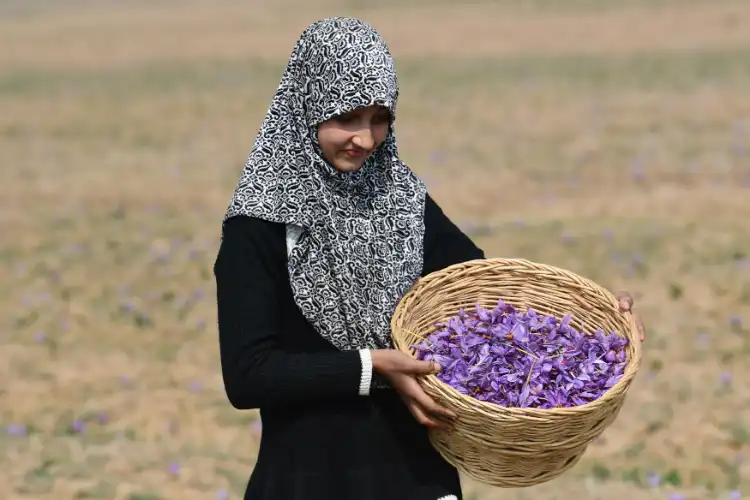
Ehsan Fazili/Srinagar
The drab-looking krewas (plateaus) of Pampore, 17 km from Srinagar, have come alive with saffron bloom filling the air with a sweet and gentle fragrance. This is India’s largest field of the world’s costliest spice and decidedly one of the best in the world.
Although harvesting is going on, the farmers and officials estimate that this season Kashmir may have a bumper crop after many years of gradual decline in saffron production.
Saffron Field of Pampore
The labour-intensive work of picking flowers that bloom overnight is in progress these days. Saffron adds to the charms of Kashmir’s autumn that turns the whole Valley into riots of colours with leaves in different stages of colour-change.
About 30,000 families from 226 villages around the Pampore area of the Pulwama district are associated with the saffron crop. This forms over 95 percent of India’s saffron production. Saffron is also grown in the Doda district in the Jammu region.
Kashmir’s saffron is rated as high quality due to longer strands and stronger flavour in comparison with the produce from Iran.
The purple saffron flowers start blooming by the end of October for about two weeks. The flowers are plucked carefully by hand, after the sun-rise. Later, the stigma (orange part of the flower) that is saffron is separated for drying and packaging as saffron.
The harvesting season also attracts tourists and is since been promoted as part of Agri-tourism by the government.
Atul Dulloo, , Additional Chief Secretary, Agriculture Production Department, said: “It is an important cash crop and the Department is working to boost this harvest to its full potential”.
Saffron Crop
Director, Agriculture Kashmir, Chowdhury Mohammad Iqbal, said that saffron flower-picking was rejuvenating and has asked the concerned officers to “work in close coordination with the saffron growers and guide them at every step during and after the harvesting saffron crop”.
In Kashmir, saffron locally called Kong is traditionally used in various preparations like kahwa, marriages, and other festive occasions and Wazwan, Kashmiri cuisine.
G M (Bhat) Pampori, the head of the All J&K Saffron Growers and Dealers Association is however worried about the dwindling saffron production in the past three decades.
He told Awaz-the voice that earlier the saffron fields have shrunk from 1.60 lakh kanal to about 42,000 kanal and the crop production has dwindled from 30,000-35000 kg to 3000-4000 kg. The falling production had led to the import of Iranian saffron, Bhat said.
He said that the Government initially did not show as much urgency to tackling the issues with saffron as it did with fresh fruit crops. He lists three reasons for the decline in saffron production: natural causes mainly due to weather, neglect by the farmers, who tended to lucrative jobs leaving the care of farms into the hands of labourers from outside, and the government’s indifference to the past.
However in the last two years, the newly established India International Kashmir Saffron Trading Centre (IIKSTC) at Dussu, Pampore, has helped in boosting saffron production. It provides facilities for preserving, grading, processing, and marketing saffron for the growers. It processed 20 kg of pure saffron in its first year, 2020, and 70 kg in 2021, according to the officials at its Collection Centre.
“The Centre has an added attraction for the farmers, quality of the product and doubles the prices”, said Tariq Ahmad Parrey, in charge of the Centre. “It is hassle-free for the consumers, who get 100 percent quality product with GI tagging”, he added.
The farmers have already started to deposit their harvest with the Centre, and everyone is hoping the harvest would be much higher.
“The demand is higher this year and it is expected that nearly 300 kgs of saffron will be processed for marketing this year”, Parray said.
ALSO READ: Muslim Jamath leaders visit Sangameswarar temple near Coimbatore blast site
The Saffron Park has received an order from the Tata Company for 100 to 200 kg of saffron and it has already processed 45 kg.
